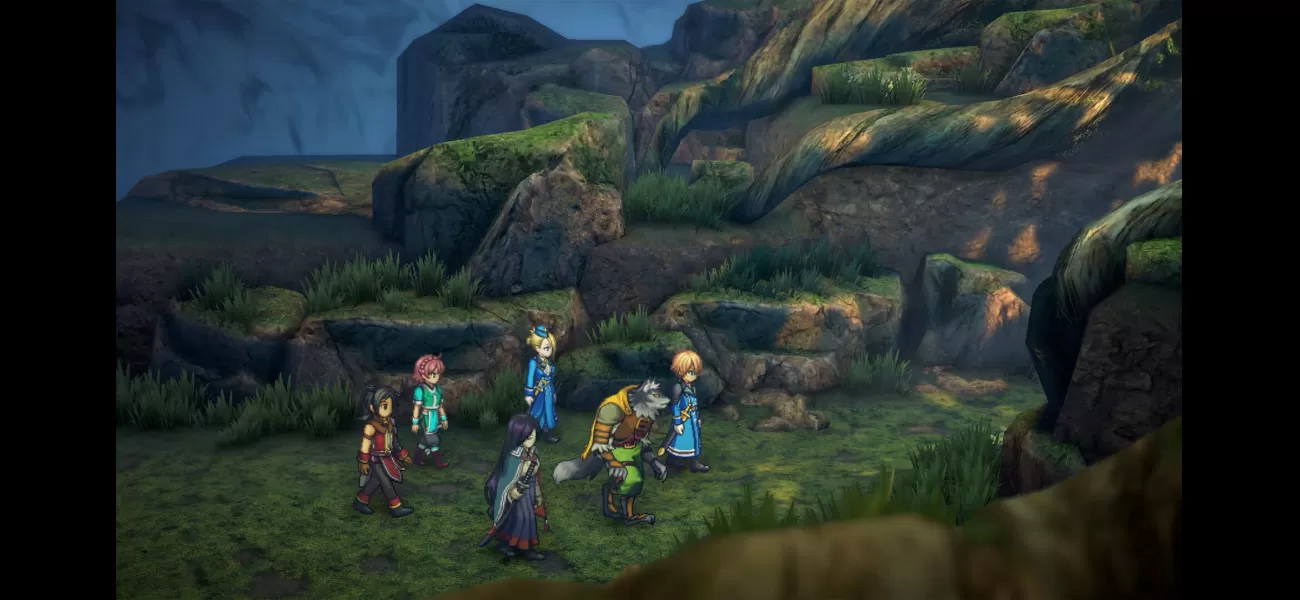"Hundreds of recruitable heroes make Eiyuden Chronicle a must-play game."
New Suikoden raised $4.5M on Kickstarter, but what does this classic JRPG have for non-fans?
April 22nd 2024.

Eiyuden Chronicle: Hundred Heroes has been making waves in the gaming world as the spiritual successor to the beloved Suikoden franchise. With over $4.5 million in funding from its successful Kickstarter campaign, it's clear that fans are eager to see what this old school JRPG has to offer. But for those who may not be familiar with the genre, what can they expect from this game?
The year 2024 has been a great year for Japanese role-playing games, with a diverse range of titles like Granblue Fantasy: Relink, Like A Dragon: Infinite Wealth, Persona 3 Reload, and Dragon's Dogma 2. And there's still more to come, such as Akira Toriyama's Sand Land, Elden Ring: Shadow Of The Erdtree, and a remaster of Paper Mario: The Thousand-Year Door. This just goes to show that JRPGs are not just limited to turn-based games set in a fantasy world with an anime-inspired art style. However, Eiyuden Chronicle: Hundred Heroes stays true to its roots as a classic JRPG, with a major strategy element that sets it apart from other titles.
Some may compare it to the recent Unicorn Overlord, which was influenced by the 16-bit classic Ogre Battle. But Eiyuden Chronicle: Hundred Heroes goes beyond being a mere homage and instead feels like an unofficial remake of the beloved PS1 game, Suikoden 2. This is not surprising, given that the game's original Kickstarter campaign was pitched as a spiritual successor to Suikoden and many of the developers worked on the franchise. Fans have been eagerly awaiting its release for four years, but unfortunately, director Yoshitaka Murayama, who also worked on the first three Suikoden games, passed away before its release. However, we are certain that the final product will not disappoint, especially since there are plans for it to become an ongoing franchise.
While the retro style is a big draw for Eiyuden Chronicle: Hundred Heroes, players do not need to be familiar with Suikoden to enjoy it. The game starts off in a relatively normal fashion for a Japanese role-playing game, with players taking on the role of a new recruit to a mercenary group that acts as a paramilitary force for the League Of Nations. This group has a tense relationship with a neighboring empire, but the empire is not necessarily the main enemy. There are complex political machinations at play, revolving around powerful magical artifacts that grant individuals special abilities.
One of the key features of both Suikoden and Hundred Heroes is the ability to recruit over a hundred allies to your cause. While you can only use six of them in battle, the game also includes a strategy level element that is unlike any other similar title. Players not only recruit individuals to their party but also try to unite entire countries. This involves interacting with individuals and at times, directing entire armies in mini-games that resemble simplified versions of Fire Emblem or Advance Wars.
At the other end of the spectrum, players can also oversee duels between feuding characters. However, these tend to rely heavily on luck, making it feel like players do not have much influence over the outcome. A more satisfying aspect is upgrading the home base, which unlocks new options, weapons, and even characters that cannot be recruited through other means.
Recruiting new allies is not only essential for progression, but it is also one of the main motivations for players to keep playing. It encourages a Pokémon-like obsession with collecting as many characters as possible. Some of these characters may be recruited simply for their novelty, such as a shark-person or an out-of-place luchador. Others have interesting backstories and personalities that make them more than just a mere addition to the team.
Each character also has their own unique set of skills and abilities, making them valuable in combat. However, players will inevitably start to rely on a core team of six characters for most turn-based battles. The game offers an autopilot option for battles, but this does not mean that combat is mindless. Enemies and allies fight in two rows, so players must carefully prioritize their targets. Additionally, there is a Gambit system similar to Final Fantasy 12, allowing players to customize the AI of each character to a useful level of detail. This means that even with the autopilot option, players must still strategize and make decisions during battles.
Graphically, Eiyuden Chronicle: Hundred Heroes has a mix of 2D sprites and 3D backgrounds. The sprites are charming and full of character, while some of the 3D backdrops are impressively detailed. However, there are some areas that are not as well-designed, and the camera can be a bit problematic. Despite being fixed most of the time, it tends to obstruct the view of characters or point at nothing.
One aspect that may be a sticking point for some players is the use of random battles, similar to Suikoden 2. While the frequency is much lower than in older games, it still discourages exploration as players can get randomly interrupted by enemies at any time. This can make it difficult to fully explore the game's world, as players may be hesitant to wander too far and risk getting into a battle.
Another potential issue is the slow-paced and vague plot and objectives in the first few hours of the game. This can be frustrating, especially since there is a lot of backtracking and fast travel does not unlock until later in the game. Fans who have been eagerly waiting for the release of Hundred Heroes may not mind these issues, but they may be off-putting to new players. However, the amount of level grinding needed is less than in older JRPGs, making it more accessible to modern players.
In conclusion, Eiyuden Chronicle: Hundred Heroes is a charming and well-crafted JRPG that stays true to its roots while offering new elements that set it apart from other titles in the genre. Its retro style and varied gameplay make it a must-play for fans of classic Japanese role-playing games, but even those who are new to the genre can still enjoy it. With over a hundred allies to recruit, a unique strategy element, and engaging combat, Eiyuden Chronicle: Hundred Heroes is a game that is sure to capture the hearts of many players.
Eiyuden Chronicle: Hundred Heroes has been making waves in the gaming world recently, thanks to its successful Kickstarter campaign that raised over $4.5 million. As the spiritual successor to the beloved Suikoden franchise, this old-school JRPG has garnered a lot of attention and excitement from fans. But what about non-fans? What can this game offer to those who are new to the genre?
2024 has been a standout year for Japanese role-playing games, with a diverse range of titles being released. From the fantasy setting of Granblue Fantasy: Relink to the modern crime world of Like A Dragon: Infinite Wealth, there's something for everyone. And let's not forget about Persona 3 Reload and Dragon's Dogma 2. But amidst all these unique and varied games, Eiyuden Chronicle: Hundred Heroes stands out as a classic, turn-based JRPG with a major strategy element that sets it apart.
While some may compare it to the recent Unicorn Overlord, which was only influenced by the 16-bit classic Ogre Battle, Eiyuden Chronicle: Hundred Heroes takes things a step further. With its striking resemblance to the PS1 game Suikoden 2 and a battle system that pays homage to its predecessor, it's clear that this game is a true spiritual successor. This is no surprise, considering that many of the developers also worked on Suikoden.
Fans have been eagerly anticipating the release of Eiyuden Chronicle: Hundred Heroes for four years now. Sadly, director Yoshitaka Murayama, who played a major role in the first three Suikoden games, passed away before its release. Despite this tragic loss, we're confident that the final product will be a success and a fitting tribute to Murayama's legacy. And the good news is, this is just the beginning of an ongoing franchise.
While the retro-style graphics are a major draw for many, you don't need any prior knowledge of Suikoden to enjoy Eiyuden Chronicle: Hundred Heroes. The game starts off like a typical Japanese RPG, with you playing as a new recruit in a mercenary group. But things quickly become more complex as you navigate a world of political intrigue, magical artifacts, and powerful enemies.
The key mechanic that sets both Suikoden and Hundred Heroes apart is the ability to recruit over a hundred allies to your cause. And while you can only bring six of them into battle at a time, there's a whole other level of strategy involved in uniting entire countries and directing armies in mini-games reminiscent of Fire Emblem or Advance Wars. But don't worry, there's still plenty of traditional turn-based combat to keep you engaged.
Of course, the real motivation for recruiting all these allies is the Pokémon-like satisfaction of collecting them all. Some are just for fun, like a shark-person or a luchador, while others have interesting backstories and personalities. And with each character bringing their unique abilities to combat, there's always something new to discover and strategize with.
Speaking of combat, while it may seem like you can just put it on autopilot, there's still a level of strategy involved. Enemies and allies fight in two rows, so you'll need to prioritize your targets carefully. And for those who want more control, there's a Gambit system similar to Final Fantasy 12 that allows you to customize the AI of each character to your liking.
Visually, Eiyuden Chronicle: Hundred Heroes is a mixed bag. The 2D sprites are charming and full of personality, but some of the 3D backgrounds leave something to be desired. And the camera, unfortunately, is universally poor, constantly getting in the way and obstructing your view.
But perhaps the biggest sticking point for many will be the use of random battles, a feature that was common in older games but has since fallen out of favor. While the frequency of these battles is lower than in the past, they can still be disruptive and discouraging for those who want to explore and progress at their own pace.
The slow-paced and vague plot of Eiyuden Chronicle: Hundred Heroes may also be a turn-off for some players, especially in the first few hours of the game. And with a fair amount of backtracking and limited fast travel options, it can feel like a slog at times. But for fans of the genre and those who enjoy a good grind, these may be minor issues that can be overlooked.
In conclusion, Eiyuden Chronicle: Hundred Heroes is a must-play for fans of classic JRPGs and a welcome addition to the genre. Its unique blend of turn-based combat, strategic army-building, and diverse cast of characters make it a standout among modern role-playing games. While it may not be for everyone, it's a game that is sure to please its dedicated fanbase and leave a lasting impression on those who give it a chance.
The year 2024 has been a great year for Japanese role-playing games, with a diverse range of titles like Granblue Fantasy: Relink, Like A Dragon: Infinite Wealth, Persona 3 Reload, and Dragon's Dogma 2. And there's still more to come, such as Akira Toriyama's Sand Land, Elden Ring: Shadow Of The Erdtree, and a remaster of Paper Mario: The Thousand-Year Door. This just goes to show that JRPGs are not just limited to turn-based games set in a fantasy world with an anime-inspired art style. However, Eiyuden Chronicle: Hundred Heroes stays true to its roots as a classic JRPG, with a major strategy element that sets it apart from other titles.
Some may compare it to the recent Unicorn Overlord, which was influenced by the 16-bit classic Ogre Battle. But Eiyuden Chronicle: Hundred Heroes goes beyond being a mere homage and instead feels like an unofficial remake of the beloved PS1 game, Suikoden 2. This is not surprising, given that the game's original Kickstarter campaign was pitched as a spiritual successor to Suikoden and many of the developers worked on the franchise. Fans have been eagerly awaiting its release for four years, but unfortunately, director Yoshitaka Murayama, who also worked on the first three Suikoden games, passed away before its release. However, we are certain that the final product will not disappoint, especially since there are plans for it to become an ongoing franchise.
While the retro style is a big draw for Eiyuden Chronicle: Hundred Heroes, players do not need to be familiar with Suikoden to enjoy it. The game starts off in a relatively normal fashion for a Japanese role-playing game, with players taking on the role of a new recruit to a mercenary group that acts as a paramilitary force for the League Of Nations. This group has a tense relationship with a neighboring empire, but the empire is not necessarily the main enemy. There are complex political machinations at play, revolving around powerful magical artifacts that grant individuals special abilities.
One of the key features of both Suikoden and Hundred Heroes is the ability to recruit over a hundred allies to your cause. While you can only use six of them in battle, the game also includes a strategy level element that is unlike any other similar title. Players not only recruit individuals to their party but also try to unite entire countries. This involves interacting with individuals and at times, directing entire armies in mini-games that resemble simplified versions of Fire Emblem or Advance Wars.
At the other end of the spectrum, players can also oversee duels between feuding characters. However, these tend to rely heavily on luck, making it feel like players do not have much influence over the outcome. A more satisfying aspect is upgrading the home base, which unlocks new options, weapons, and even characters that cannot be recruited through other means.
Recruiting new allies is not only essential for progression, but it is also one of the main motivations for players to keep playing. It encourages a Pokémon-like obsession with collecting as many characters as possible. Some of these characters may be recruited simply for their novelty, such as a shark-person or an out-of-place luchador. Others have interesting backstories and personalities that make them more than just a mere addition to the team.
Each character also has their own unique set of skills and abilities, making them valuable in combat. However, players will inevitably start to rely on a core team of six characters for most turn-based battles. The game offers an autopilot option for battles, but this does not mean that combat is mindless. Enemies and allies fight in two rows, so players must carefully prioritize their targets. Additionally, there is a Gambit system similar to Final Fantasy 12, allowing players to customize the AI of each character to a useful level of detail. This means that even with the autopilot option, players must still strategize and make decisions during battles.
Graphically, Eiyuden Chronicle: Hundred Heroes has a mix of 2D sprites and 3D backgrounds. The sprites are charming and full of character, while some of the 3D backdrops are impressively detailed. However, there are some areas that are not as well-designed, and the camera can be a bit problematic. Despite being fixed most of the time, it tends to obstruct the view of characters or point at nothing.
One aspect that may be a sticking point for some players is the use of random battles, similar to Suikoden 2. While the frequency is much lower than in older games, it still discourages exploration as players can get randomly interrupted by enemies at any time. This can make it difficult to fully explore the game's world, as players may be hesitant to wander too far and risk getting into a battle.
Another potential issue is the slow-paced and vague plot and objectives in the first few hours of the game. This can be frustrating, especially since there is a lot of backtracking and fast travel does not unlock until later in the game. Fans who have been eagerly waiting for the release of Hundred Heroes may not mind these issues, but they may be off-putting to new players. However, the amount of level grinding needed is less than in older JRPGs, making it more accessible to modern players.
In conclusion, Eiyuden Chronicle: Hundred Heroes is a charming and well-crafted JRPG that stays true to its roots while offering new elements that set it apart from other titles in the genre. Its retro style and varied gameplay make it a must-play for fans of classic Japanese role-playing games, but even those who are new to the genre can still enjoy it. With over a hundred allies to recruit, a unique strategy element, and engaging combat, Eiyuden Chronicle: Hundred Heroes is a game that is sure to capture the hearts of many players.
Eiyuden Chronicle: Hundred Heroes has been making waves in the gaming world recently, thanks to its successful Kickstarter campaign that raised over $4.5 million. As the spiritual successor to the beloved Suikoden franchise, this old-school JRPG has garnered a lot of attention and excitement from fans. But what about non-fans? What can this game offer to those who are new to the genre?
2024 has been a standout year for Japanese role-playing games, with a diverse range of titles being released. From the fantasy setting of Granblue Fantasy: Relink to the modern crime world of Like A Dragon: Infinite Wealth, there's something for everyone. And let's not forget about Persona 3 Reload and Dragon's Dogma 2. But amidst all these unique and varied games, Eiyuden Chronicle: Hundred Heroes stands out as a classic, turn-based JRPG with a major strategy element that sets it apart.
While some may compare it to the recent Unicorn Overlord, which was only influenced by the 16-bit classic Ogre Battle, Eiyuden Chronicle: Hundred Heroes takes things a step further. With its striking resemblance to the PS1 game Suikoden 2 and a battle system that pays homage to its predecessor, it's clear that this game is a true spiritual successor. This is no surprise, considering that many of the developers also worked on Suikoden.
Fans have been eagerly anticipating the release of Eiyuden Chronicle: Hundred Heroes for four years now. Sadly, director Yoshitaka Murayama, who played a major role in the first three Suikoden games, passed away before its release. Despite this tragic loss, we're confident that the final product will be a success and a fitting tribute to Murayama's legacy. And the good news is, this is just the beginning of an ongoing franchise.
While the retro-style graphics are a major draw for many, you don't need any prior knowledge of Suikoden to enjoy Eiyuden Chronicle: Hundred Heroes. The game starts off like a typical Japanese RPG, with you playing as a new recruit in a mercenary group. But things quickly become more complex as you navigate a world of political intrigue, magical artifacts, and powerful enemies.
The key mechanic that sets both Suikoden and Hundred Heroes apart is the ability to recruit over a hundred allies to your cause. And while you can only bring six of them into battle at a time, there's a whole other level of strategy involved in uniting entire countries and directing armies in mini-games reminiscent of Fire Emblem or Advance Wars. But don't worry, there's still plenty of traditional turn-based combat to keep you engaged.
Of course, the real motivation for recruiting all these allies is the Pokémon-like satisfaction of collecting them all. Some are just for fun, like a shark-person or a luchador, while others have interesting backstories and personalities. And with each character bringing their unique abilities to combat, there's always something new to discover and strategize with.
Speaking of combat, while it may seem like you can just put it on autopilot, there's still a level of strategy involved. Enemies and allies fight in two rows, so you'll need to prioritize your targets carefully. And for those who want more control, there's a Gambit system similar to Final Fantasy 12 that allows you to customize the AI of each character to your liking.
Visually, Eiyuden Chronicle: Hundred Heroes is a mixed bag. The 2D sprites are charming and full of personality, but some of the 3D backgrounds leave something to be desired. And the camera, unfortunately, is universally poor, constantly getting in the way and obstructing your view.
But perhaps the biggest sticking point for many will be the use of random battles, a feature that was common in older games but has since fallen out of favor. While the frequency of these battles is lower than in the past, they can still be disruptive and discouraging for those who want to explore and progress at their own pace.
The slow-paced and vague plot of Eiyuden Chronicle: Hundred Heroes may also be a turn-off for some players, especially in the first few hours of the game. And with a fair amount of backtracking and limited fast travel options, it can feel like a slog at times. But for fans of the genre and those who enjoy a good grind, these may be minor issues that can be overlooked.
In conclusion, Eiyuden Chronicle: Hundred Heroes is a must-play for fans of classic JRPGs and a welcome addition to the genre. Its unique blend of turn-based combat, strategic army-building, and diverse cast of characters make it a standout among modern role-playing games. While it may not be for everyone, it's a game that is sure to please its dedicated fanbase and leave a lasting impression on those who give it a chance.
[This article has been trending online recently and has been generated with AI. Your feed is customized.]
[Generative AI is experimental.]
0
0
Submit Comment





